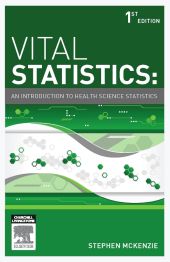Vital Statistics, 1st Edition
Vital Statistics: an introduction to health science statistics draws on real world, health-related and local examples, with a broad appeal to the Health Sciences student , it demonstrates how an understanding of statistics is useful both in the real world, and in statistics exams.
Written in recognition of Health Sciences courses which require knowledge of statistical literacy, this book guides the reader to an understanding of why, as well as how and when to use statistics.
It explores:
- How data relates to information, and how information relates to knowledge
- How to use statistics to distinguish information from disinformation
- The importance of probability, in statistics and in life
- That inferential statistics allow us to infer from samples to populations, and how useful such inferences can be
- How to appropriately apply and interpret statistical measures of difference and association
- How qualitative and quantitative methods differ, and when it’s appropriate to use each
- The special statistical needs of the health sciences, and some especially health science relevant statistics
- The vital importance of computers in the statistical analysis of data, and gives an overview of the most commonly used analyses
Vital Statistics: an introduction to health science statistics draws on real world, health-related and local examples, with a broad appeal to the Health Sciences student , it demonstrates how an understanding of statistics is useful both in the real world, and in statistics exams.
Written in recognition of Health Sciences courses which require knowledge of statistical literacy, this book guides the reader to an understanding of why, as well as how and when to use statistics.
It explores:
- How data relates to information, and how information relates to knowledge
- How to use statistics to distinguish information from disinformation
- The importance of probability, in statistics and in life
- That inferential statistics allow us to infer from samples to populations, and how useful such inferences can be
- How to appropriately apply and interpret statistical measures of difference and association
- How qualitative and quantitative methods differ, and when it’s appropriate to use each
- The special statistical needs of the health sciences, and some especially health science relevant statistics
- The vital importance of computers in the statistical analysis of data, and gives an overview of the most commonly used analyses
Key Features
- Real-life local examples of health statistics are presented, e.g. A study conducted at the Department of Obstetrics and Gynecology, University of Utah School of Medicine, explored whether there might be a systematic bias affecting the results of genetic specimen tests, which could affect their generalizability.
- Reader-friendly writing style
- t-tests/ ANOVA family of inferential statistics all use variants of the same basic formula
- Learning Objectives at the start of each chapter and Quick Reference Summaries at the end of each chapter provide the reader with a scope of the content within each chapter.
Author Information




